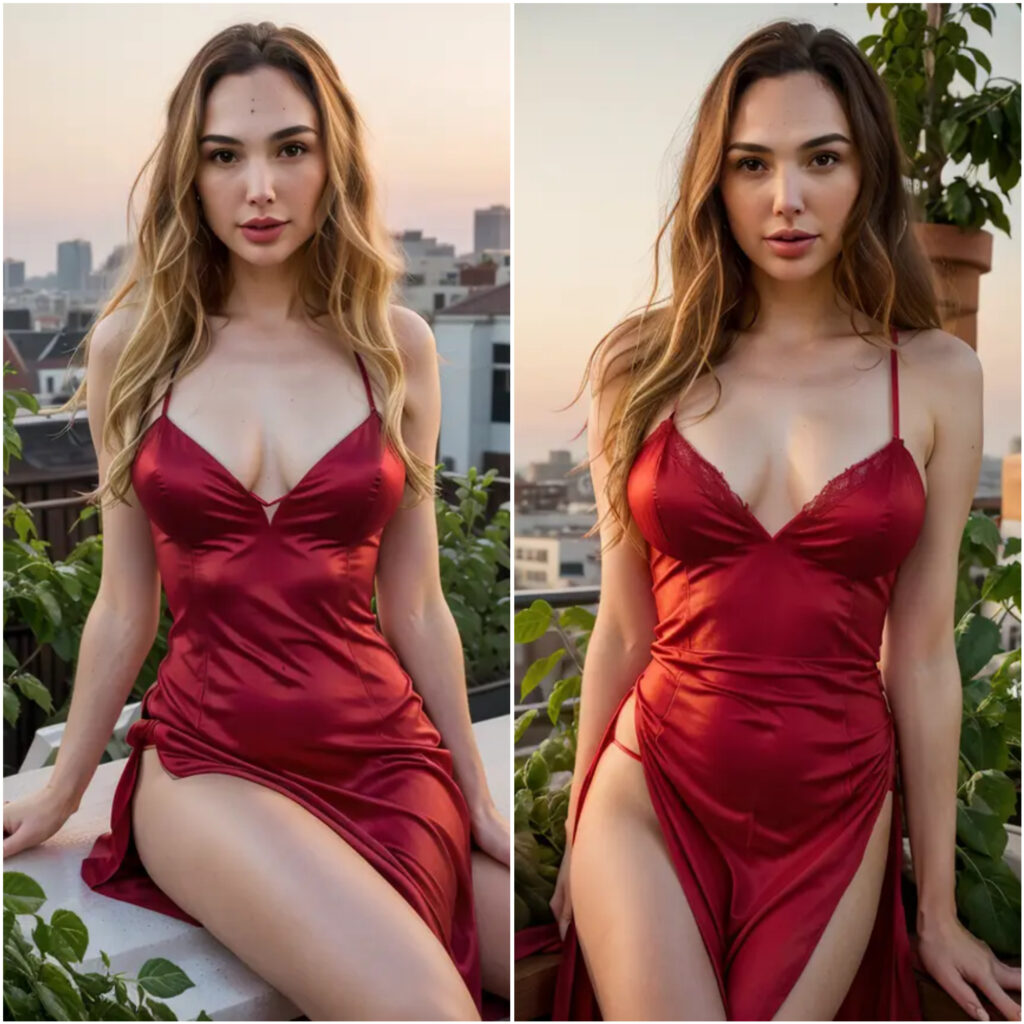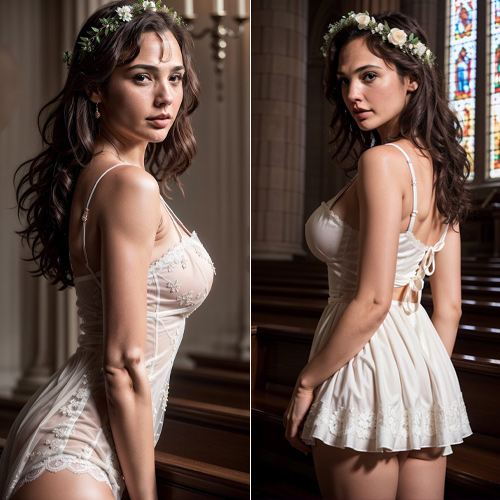With Gadot’s new Netflix movie, the actress and producer on the project wanted to do more. “I grew up watching ‘Bond,’ and ‘Mission: [Impossible],’ and ‘Bourne Identity’ and ‘Die Hard,’” Gadot told TheWrap in an interview conducted before the SAG-AFTRA strike. “I love these movies. I love the action, and the twists and turns and drama, the scope. I want to make movies that the audience can come in and we can take them through a journey for two hours, and make them feel at the end of it as if they went through a grand tour around the world and went through a rollercoaster of emotion.”
After the massive box office success of “Wonder Woman” in 2017 (the film grossed $412.6 million in the United States alone), Gadot saw the opportunity to craft a potential franchise of her own from scratch. “I had an aha moment,” she said. “I was like, ‘Wait a second. Men go to see these films. There’s more space, more room for female-led action films.’”
Rachel Stone is also a different character for Gadot, who has often played warm-hearted characters with a deep empathy for people. Here, Stone is a lonely individual acting as a dual agent for both MI6 and a shadowy global peacekeeping agency. “She’s a woman of many contradictions,” Gadot said. “I felt like the plot was clashing with the character, which is always a good thing in a movie. I played her as someone who really wants [to] but just can’t have connections.”
But because she’s completely an original character, that required Gadot and screenwriters Greg Rucka and Allison Schroeder to dive deep into who the character was. “It’s not like Rachel Stone is based on a comic book or an IP or on a series of books,” Gadot said. “We had to really establish everything from the ground up.” The actress emphasized she wanted immense set pieces, but grounded, layered characters who could inject pathos alongside the explosions.
During TheWrap’s cover story interview, Gadot and costar Alia Bhatt went on to discuss the struggles of filming a globe-trotting action franchise and why they don’t buy into the stigma that female-led action movies aren’t successful.

Alia, what was the pitch for you to join this movie?
Alia Bhatt: I don’t think there was much pitching needed. It was this action film with Gal Gadot in the lead, also producing, [a] very good part, etc, etc. OK! Let’s read the script. Let’s start the movie. I met with Tom [Harper], our director on Zoom, and we just completely hit it off.
One of the first things I remember discussing with him is the importance of emotion in an action film, because sometimes I feel like the action films [don’t] necessarily land the characters and the emotions as well. I don’t want to just do a big film just for the heck of it. It’s so important to get that balance and he resonated with all of that.
Gal, were there any specific requirements for you in what you wanted in a costar?
GG: I was looking for somebody who is multilayered and talented. For somebody to not be an obvious choice. I saw “Gangubai” and I just fell in love with Alia’s talent. She was our first go-to; she was everyone’s first choice and we’re so happy that we got her.
Gal, can you talk about playing this character differently compared to Wonder Woman or even Gisele in “Fast and Furious?
GG: I don’t want to repeat myself. I want to do something different. Every new movie I make and explore different characters. This one is just so grounded, and gritty and raw. The tone is different than any of the other movies I’ve ever done. And it’s also about working with different filmmakers. They are the ones that are holding the compass to the vision. And Tom [Harper] is someone I was really passionate to work with.
It’s funny, it’s not because of “The Aeronauts,” he really impressed me with a small indie movie that he did with Jessie Buckley called “Wild Rose.” I saw the movie and I was thinking, “Wow, that’s going to be so interesting to bring a filmmaker [who] is character driven into an action film.” We knew that we were going to have an incredible second unit director. We knew we were going to have incredible teams all around. What I cared about was the heart, the flash of the movie, of the characters, and I felt like bringing someone like Tom would make them shine.

Alia, this is your American debut. What’s been the challenge approaching a movie like this compared to your work in India?
AB: I’m not sure if there was anything challenging. Culturally, yes, there are differences and that’s welcome differences, just in terms of pace and timing and work hours. That’s why I came into this completely raw, just by myself. I have my people, my technical team, hair, makeup, all of that in India, and I’m comfortable with them; I’ve been working with them for 10 years. Here I am on a set just by myself with me and my belongings, nothing else. So that was quite refreshing for me to experience that after working for 10 years in an industry and made me feel very empowered that I was able to go on this experience. But in terms of filmmaking, it’s the same.
GG: She’s so humble. She was pregnant. She did everything while carrying a baby. It was phenomenal to watch. We were traveling the world. She traveled the world with us, early calls, late nights, overtime. She did everything. It was remarkable.
Was there a sequence that you filmed for this that still haunts you in terms of difficulty?
GG: We filmed in the south of Portugal, there’s a desert there. And we filmed [at] like 3:30 a.m., 4 a.m. We filmed at like a funny hour when the sun is just starting to shine, but it’s not yet. I’ve never eaten so much sand in my entire life. I had sand everywhere, literally. That was the lovely thing about filming in so many locations. On the one hand, it’s gorgeous. It’s beautiful. Iceland, Italy, the Alps, Portugal, Morocco, all these places. But you deal with [a] real climate. It was so damp. It was so wet. We had sand everywhere. We couldn’t open our eyes, it was that bad. So if I have to choose one for the both of us, I would choose this one.

Do you think the stigma about women-led action films not being successful is still omnipresent?
GG: I don’t know if I want to believe the stigma because the reason why I had a belief that this could be super successful was only after the success we experienced with “Wonder Woman.” So, no, I think as long as the story is good it has great potential to be a huge success.
AB: It’s the story that matters and the gender is secondary. It’s a question I have answered a lot, even in India and in the Indian film industry. I’ve led a lot of my films and they have also been commercially successful at the box office and the question still comes up because it’s still surprising. We need to reach that point where the element of surprise doesn’t exist. They should just be movies.
I always say, “Would you ask a man this question?” I remember it came my way a lot when I was pregnant. I got this question a lot like, “What do you have to say about having a baby at the peak of your career?” And I said, “Would you ask the same question to my husband because he’s also at the peak of his career?” There was no answer. For some reason, even when women do it repeatedly we’re still asked the question, so we need to just lead by example and eliminate the question.
“Heart of Stone” streams on Netflix August 11.



